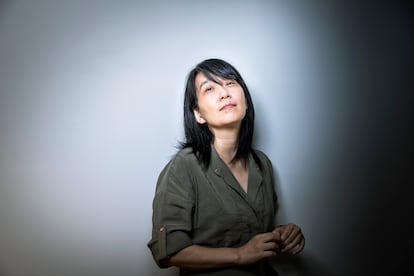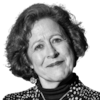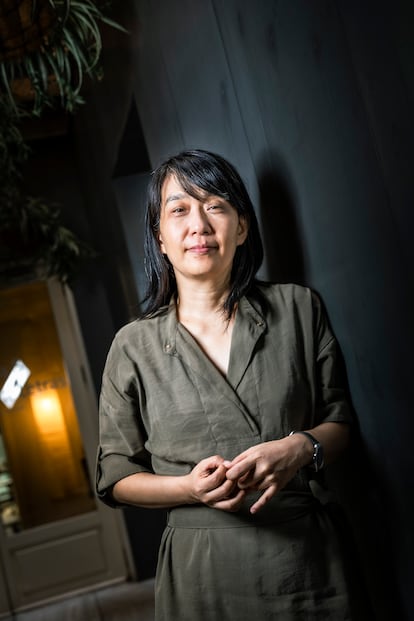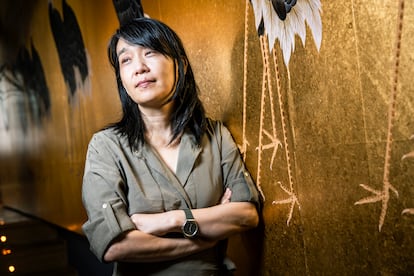Han Kang, the star author of South Korean literature, returns: ‘I stopped writing for a year and forgot how to do it’
The writer, after the success of ‘The Vegetarian,’ returns with ‘Greek Lessons,’ a novel about how, even amidst silence, language can help fight against isolation


Han Kang is one of the most sublime writers on the contemporary stage. She won the International Booker Prize in 2016 with her novel The Vegetarian, a suffocating portrait of the isolation that a person can immerse themselves in by making a change in their lives without the permission of others.
The South Korean author, born in Gwangju, in 1970, has now published Greek Lesson. The novel is a cry of silence, in which language fights against its annihilation. The protagonist is a woman who has lost her voice, her mother, as well as custody of her son. To combat these tragedies, she turns to a dead language — ancient Greek — in an attempt to recover what has been taken from her. And, in her class, she will find a professor who is going blind… just like Borges, an author who is very present throughout this book. The relationship between the two forms the backbone of a story that raises many questions for the reader: how would we live without a voice? What if we knew that we were going to lose our sight?
Han Kang spoke with EL PAÍS while passing through Madrid.
Question. Does your latest novel come from personal experience?
Answer. After The Vegetarian, which was my third novel, I started writing the fourth. But when I reached the seventh chapter, I couldn’t continue, I got blocked. I stopped writing for a year and forgot how to do it. I also couldn’t read any fiction. After a long rest, I was able to do it again. And thus, this fifth novel was born — Greek Lessons — which certainly arose from the silence that I have experienced.
Q. Why do you think you lost the ability to write?
A. Maybe because I wasn’t sincere at that time. I lacked sincerity when writing — that’s why I couldn’t continue. Later, I realized that truth can also be included within fiction. By writing fiction, it doesn’t necessarily mean that you lose the truth. You have to look for those paths [that can lead you back to writing], even if they’re narrow.
The author discusses the inner sincerity of the novel and her attempt at authenticity as a writer, which ultimately mark her characters and her work. In this territory, language occupies a key space. And, at the same time, language is the driving force of awakening, but also of collapse and silence. The reader mustn’t forget that the protagonist has a son whom she cannot speak to.
Q. What do voice and language mean to you and your protagonist?
A. The protagonist has lost her speech and is trying to recover it with all her might. That process of recovering language is the process of recovering your life.
Q. How would you define language?
A. It’s a unique and important medium, but, at the same time, it’s what makes me suffer. Because it’s an impossible medium, it slips easily.
Q. You once said that language is a double-edged sword that you cannot grasp.
A. Yes, that’s what I was thinking while writing this book. Language is the only medium that makes me embrace life and, at the same time, shed blood. I cling tightly to language, but I also get tired of dealing with it.

Q. You are a poet and your book is also poetic. Is a writer without poetry a poorer writer?
A. There are authors who have never written poetry, but, in their own work, poetry is present. When I write a novel, I feel that poems invade my work. Sometimes, I use a poem itself and, other times, normal phrases with poetic touches. Poetry has influenced me a lot.
Q. You mention Borges and are inspired by him. What does he mean to you?
A. In addition to everything that I love about his work, he said that progressively losing your sight is equivalent to the summer night getting closer and closer… that’s how he put it. And that, to me, is the story we have in common. It’s the condition that all of us have, all human beings.
Although she does not wish to define herself, Han Kang can be considered the novelist of isolation and loss. In The Vegetarian, the protagonist loses every relationship. Only her sister, who doesn’t even understand her, remains. In Greek Lessons, two isolated characters find each other. “In silence, we can feel the language more strongly,” Han notes.
When asked how to describe her latest book, she replies: “It’s a novel that asks questions.” And she reveals the question that guided her: what’s the softest part of human beings?
Well, the protagonist responds by writing in the palm of her teacher’s hand: that’s how she communicates. “For me, the most important thing is to cut your nails well, so as not to hurt the other person when you write on their hand, in the dark and in silence. This scene is the most important one for me. I speak of the softness and tenderness of the interior of the human being.”
Han chose ancient Greek thanks to a conversation with a philosophy editor, who taught her many attractive things about the language. “A word has many meanings. That attracted me a lot. And, at the same time, it’s a dead language. That paradox also interested me quite a bit.”
Han writes as soon as he wakes up, even though she’s barely opened her eyes yet. “It’s when my mind is most clear.” Her fourth novel — the one that caused her writer’s block — was eventually completed and will soon be published in English. Her unstoppable career has allowed her to forge a connection with the reading public in numerous countries. She’s aware that the South Korean boom (in both literature and film) has also helped her succeed in the West, where, lately, she finds more and more people greeting her in her language and saying that they are learning it.
“The luck I have is that it seems as if I have a button that I can turn on and off all the time. When I write, I don’t think about the readers… I leave that button off. And, when it comes to writing, I only think about that: writing. That’s my luck.”

Translated by Avik Jain Chatlani.
Sign up for our weekly newsletter to get more English-language news coverage from EL PAÍS USA Edition
Tu suscripción se está usando en otro dispositivo
¿Quieres añadir otro usuario a tu suscripción?
Si continúas leyendo en este dispositivo, no se podrá leer en el otro.
FlechaTu suscripción se está usando en otro dispositivo y solo puedes acceder a EL PAÍS desde un dispositivo a la vez.
Si quieres compartir tu cuenta, cambia tu suscripción a la modalidad Premium, así podrás añadir otro usuario. Cada uno accederá con su propia cuenta de email, lo que os permitirá personalizar vuestra experiencia en EL PAÍS.
¿Tienes una suscripción de empresa? Accede aquí para contratar más cuentas.
En el caso de no saber quién está usando tu cuenta, te recomendamos cambiar tu contraseña aquí.
Si decides continuar compartiendo tu cuenta, este mensaje se mostrará en tu dispositivo y en el de la otra persona que está usando tu cuenta de forma indefinida, afectando a tu experiencia de lectura. Puedes consultar aquí los términos y condiciones de la suscripción digital.








































